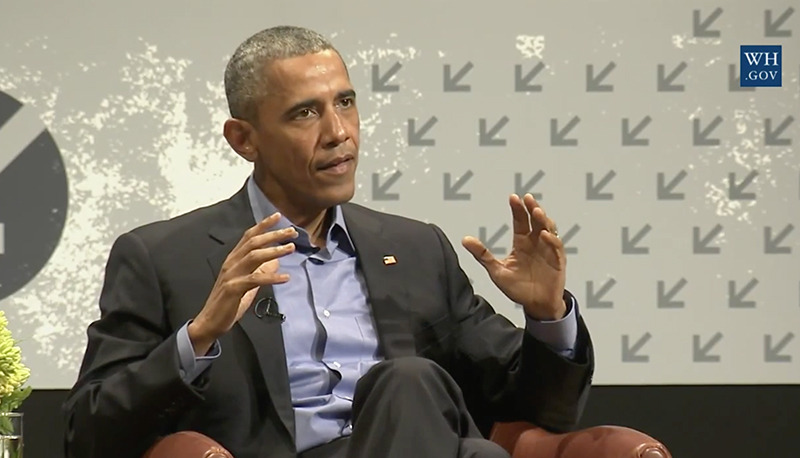Speaking on the encryption debate at SXSW Interactive in Austin on Friday, President Barack Obama carefully navigated the waters between government overreach and civil liberties, saying that while both sides need to make concessions, encryption advocates should avoid taking an absolutist stance on the issue.
During a lengthy and wide-ranging discussion with Evan Smith, Editor in Chief of The Texas Tribune, Obama delivered what at first blush appears to be an even-keeled presentation of a topic that has, over the past month, morphed into a war of words between the Department of Justice and Apple.
"Technology is evolving so rapidly that new questions are being asked, and I am of the view that there are very real reasons why we want to make sure the government cannot just willy-nilly get into everybody's iPhones — or smartphones — that are full of very personal information," Obama said.
A federal magistrate judge in February ordered Apple to help the FBI break into a passcode-protected iPhone used by San Bernardino terror suspect Syed Rizwan Farook. The company is resisting, claiming, among other things, that the creation of a software workaround inherently weakens iOS encryption mechanisms and would thus put all iPhones at risk.
Unlike other politicians, Obama appears to have a good grasp of the issue's technical details, noting he thinks Apple's argument is likely true, albeit overstated. However, he did caution against an "absolutist" stance on the matter, saying un-hackable encryption is not an ideal solution. Law enforcement agencies exist to ensure public safety, and they need certain tools and levels of access to do so.
Obama suggested a solution that allows for constrained government access to private data. He likened the intrusion to TSA checks at the airport, drunk driving road blocks or tax enforcement; all accepted policies that, while potentially unpleasant, are recognized as important to the greater good.
"This notion that somehow our data is different and can be walled off from those other tradeoffs we make, I believe is incorrect," he said. "My conclusion so far is that you cannot take an absolutist view on this. So if your argument is 'strong encryption no matter what, and we can and should in fact create black boxes,' that I think does not strike the kind of balance we have lived with for 200, 300 years. And it's fetishizing our phone above every other value, and that can't be the right answer."
But the issue, of course, is in finding a system of checks and balances that appeases law enforcement requests while at the same time offering high levels of protection for consumers. Obama said one solution could be allowing very narrow access to personal data, which basically describes a privileged backdoor. Apple and fellow tech companies are vehemently against such concessions.
"If everybody goes to their respective corners and the tech community says, 'you know what, either we have strong, perfect encryption, or else it's big brother and [an] Orwellian world,' what you'll find is that after something really bad happens the politics of this will swing and it will become sloppy and rushed," Obama said. "And it will go through Congress in ways that have not been thought through. And then you really will have a danger to our civil liberties because the disengaged or taken a position that is not sustainable."
 Mikey Campbell
Mikey Campbell







-m.jpg)






 Thomas Sibilly
Thomas Sibilly
 Wesley Hilliard
Wesley Hilliard
 Marko Zivkovic
Marko Zivkovic

 Malcolm Owen
Malcolm Owen

 Amber Neely
Amber Neely










102 Comments
Avoiding "absolutist" positions is even possible in this debate?
It's a binary option. Either there is a backdoor/weakness or there isn't. There is no middle ground.
So much for Obama having "a good grasp of the issue's technical details." He's not doing any better than any other politician (from both sides of the aisle) saying exactly the same thing in different words.
Yep. The president is wrong and doesn't realize it, or he's providing himself with cover to shift the blame onto others.
"...the politics of this will swing and it will become sloppy and rushed," Obama said. "And it will go through Congress in ways that have not been thought through.." Got it. In other words and like a bad cop movie.. 'we can do it the easy way. Or we can do it the hard way...'
"Law enforcement agencies exist to ensure public safety, and they need certain tools and levels of access to do so". The human brain can not be hacked, yet, therefore the government created tools like waterboarding and other torture techniques.
What a coward. On some issues, you just have to take a stand, and not be a slimy politician.